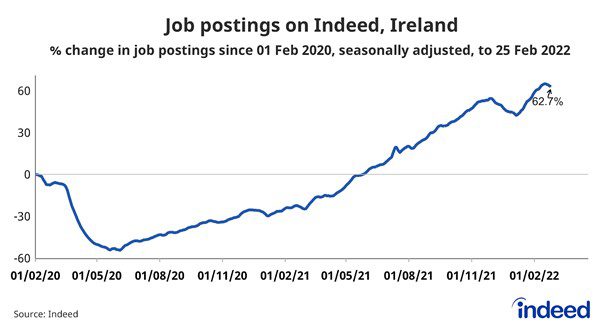Unemployment falls in February but level of long-term unemployed a concern: Indeed

"Ireland’s ability to recover rapidly from labour market shocks is notable given that the UK and eurozone economies have yet to see their labour markets recover to such a great extent," says Jack Kennedy, economist at global job site Indeed
8 March 2022
The CSO reported that the Covid-19 adjusted unemployment rate was 7% in February, down from a level of 7.8% January and down from a level of 27% a year ago.
These figures are an estimate based on the Live Register and Covid-19 related claims. The main unemployment rate was 5.2% in February on a seasonally adjusted basis, unchanged from January but down from a level of 7.5% twelve months ago.
Jack Kennedy, economist at global job site Indeed, says reduced restrictions had a noticeable impact. “The rate of unemployment fell in February,” he said, “as the reduced pandemic restrictions helped to stimulate rehiring and returned the labour market to a positive path that the Central Bank of Ireland forecasts will bring the unemployment rate down to 4.6% by the end of 2024*.
“The CSO’s recent Q4 Labour Force Survey** shows that the economy added an amazing 229,000 jobs in 2021, a gain of over 10%, putting employment levels ahead of where they were pre-pandemic,” Kennedy continued. “Ireland’s ability to recover rapidly from labour market shocks is notable given that the UK and eurozone economies have yet to see their labour markets recover to such a great extent.
 “Whilst the jobs environment looks broadly positive, an area of potential concern remains the increasing numbers in long-term unemployment (without a job for over a year): 44,300 people were categorised as long-term unemployed at the end of 2021, up over 20% on the previous year, and now representing more than a third of those without jobs,” Kennedy said.
“Whilst the jobs environment looks broadly positive, an area of potential concern remains the increasing numbers in long-term unemployment (without a job for over a year): 44,300 people were categorised as long-term unemployed at the end of 2021, up over 20% on the previous year, and now representing more than a third of those without jobs,” Kennedy said.
“With the economy performing strongly, this segment is an important area for government to focus on for training and reskilling. The Action Plan for Apprenticeships is one helpful policy lever, aiming to grow the number of new apprentice registrations to 10,000 per year by 2025. Equipping people with appropriate skills in segments of the economy experiencing labour shortages is valuable both for employers and potential apprentices.
Indeed’s data continues to show employers very actively hiring, with the level of Irish job postings on Indeed up 62.7% at 25th February 2022, compared to 1 February 2020.”
*(Source: Central Bank of Ireland Quarterly Bulletin Q1 2022: https://www.centralbank.ie/docs/default-source/publications/quarterly-bulletins/qb-archive/2022/quarterly-bulletin-q1-2022.pdf?sfvrsn=5
**(Source: CSO Labour Force Survey Q4 2021: https://www.cso.ie/en/csolatestnews/presspages/2022/labourforcesurveyq42021/)



 Print
Print






Fans 0
Followers